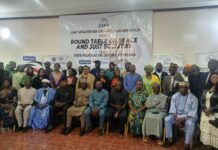Collage photo of Mr. Akan Okon and Mr. Umo Eno.
By Abasifreke Effiong
The Federal High Court sitting in Uyo has given a tentative date for judgment in the case of forgery filed against the governorship candidate of the Peoples Democratic Party in Akwa Ibom State, Mr. Umo Eno.
The presiding judge, Justice Agatha Okeke, adjourned the case on Friday for judgment “on or before November 28” after parties adopted their final address.
Mr. Eno is standing trial for alleged forgery of his educational qualifications, birth certificate, and voter’s card.
The plaintiff, Mr. Akan Okon is asking the court to disqualify Mr. Eno and declare him winner of the governorship primary, insisting that Mr. Eno was not validly nominated having forged the qualifications required to qualify him to contest for the party’s primary election.
In their final address, counsel to the 2nd defendant (Eno) led by Mr. Paul Usoro SAN, urged the court to dismiss the suit and impose deterring cost on the plaintiff.
Mr. Usoro said the plaintiff failed to prove that Eno forged the 1981 May/June West African Senior Secondary Certificate and the 1983 General Certificate of Education, urguing that it was only the issuing authorities of those certificates that can authenticate their originality.
RELATED STORY: Umo Eno calls three witnesses, insists witnesses must not be cross-examined
On the issue of alleged falsification of voter’s card, the 2nd defendant’s counsel citing Section 84 (3) of the Electoral Act argued that the possession of voter’s card was not among the constitutional qualification for the contest of election into the office of governor.
While admitting discrepancies in the date of birth of Mr. Eno, Mr. Usoro said, “in the final written address of the plaintiff, they have said absolutely nothing about date of birth. Notwithstanding the discrepancies in the date of birth, whether it is 1964 or 1961, the second defendant had met the age requirement for the election”.
Counsel to the plaintiff led by Mr. Okey Amaechi SAN, said even though the 2nd defendant brought someone to court purportedly from the West African Examination Council, WAEC did not authenticate his certificates.
“WAEC says if you want to verify the authenticity of a result, if it a private GCE candidate then a Reverend or an Imam must write a letter of attestation that you are the person, you must go to court and swear affidavit that you are the person, then you must print the whole result as you took it from online, then you attach photocopy of the certificate given to you and a postage stamp that must be paid for and send it to an address in WAEC headquarters in Yaba, Lagos. Then when they see all these things, they will verify. There are people in charge of verification of result at WAEC, none of them was called, they just got signatures somewhere without putting names of those who had signed it, claiming that they are from WAEC.”
On the argument that voter’s card was not a requirement for the contest of election into the office of governor, Mr. Amaechi said that Section 84 (14) of the Electoral Act gives political parties the powers to set guidelines for the conduct of primary election and the guideline of the party which was tendered in exhibit makes possession of voter’s card a valid requirement.
“The guideline says if anyone is nominated without meeting the qualifications, it renders that nomination invalid.”
He said the plaintiff had tendered evidence showing that the 2nd defendant was not a registered voter, “where the 2nd defendant flee from providing evidence against it and INEC failed to provide the voter’s register to authenticate the registration, the plaintiff’s allegation remains unchallenged.”
Counsel to INEC (3rd defendant), Barr. Emmanuel Eze, in his adumbration told the court that the 2nd defendant, Mr. Eno was a registered voter in INEC server and was qualified to vote and be voted for.
In his reply, the plaintiff’s counsel, Mr. Amaechi, urged the court to expunge what the 3rd defendant said on record for being irregular and not supported by any law.
Mr. Amaechi added that, “when the plaintiff sued, we served INEC our pleadings, INEC did not file any written address. We requested for the voters register, they refused to produce it. The counsel for INEC is not a party in the case, he is a lawyer and cannot give evidence from the backdoor. There is no evidence on record that he is doubling as a party in the case.”
















